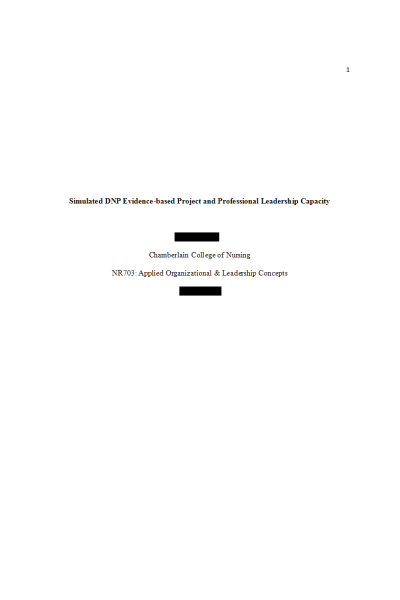NR 703 Week 3 Assignment; Leadership Capacity Part 1
-
$20.00
| Institution | Chamberlain |
| Contributor | Greenawald |
Document Preview
Organizational Needs Assessment
Substantial efforts have been made to improve the knowledge of ways to expand the influence of research on medical practice (Kochevar et al., 2006). Organizational Needs Assessment is a compelling resource for recognizing a gap within the healthcare practice to apply an evidence-based intervention. Evidence-based interventions can enhance patient safety, improve quality of life, and guarantee a positive health outcome (Najafipour et al., 2021). The assessment helps the company to understand what needs improvement and what is working. A lack of evidence-based guidelines for preventing or managing heart failure through proper education and teaching-back with patient-reflective learning can lead to hospital readmissions, death, and patient anxiety. This paper examines the issue in an Intermediate Care Telemetry Stepdown Unit (ICTSU) using a practice gap assessment tool and the PICOT (population, intervention, comparison, outcome, time) framework to define the practice question for that organization.
Problem
The Intermediate Care Telemetry Stepdown Unit (ICTSU) holds thirty-one patients, with the majority of them being admitted for cardiovascular, respiratory, and multi-organ failure issues and to be placed on continuous heart monitors. Most of them are critically ill on admission and sent to the Intensive Care Unit (ICU) until they become stable enough to be moved to ICTSU. ICTSU has been experiencing a high volume of recurrent heart failure readmissions due to a lack of proper education, demonstrating that these patients are unable to manage their condition at home. Patient teaching is vital in heart failure management (Mohammadi et al., 2021; Pereira Sousa et al., 2021; Ding et al., 2020). The issue is attributed to the lack of healthcare provider involvement in education rather than multimedia education only. Providing patients with education is very important in understanding their condition. Poor quality of life is due to insufficient knowledge of acceptance and adherence to treatment regimens, timely diagnosis, and control of symptoms (Mohammadi et al., 2021; Pereira Sousa et al., 2021; Ding et al., 2020). A collaborative approach to patient education about heart failure can be valuable in revealing behavior change in patients. It leads to patients being better engaged in their care…….. Continue
| Instituition / Term | |
| Term | Summer |
| Institution | Chamberlain |
| Contributor | Greenawald |

















